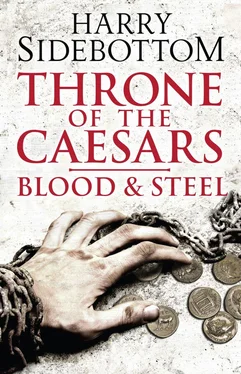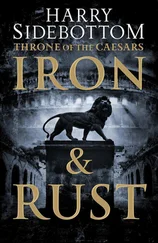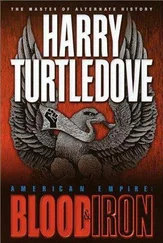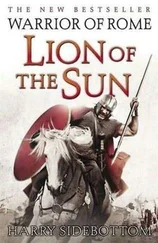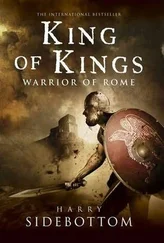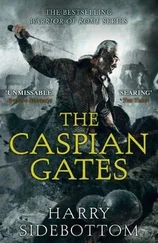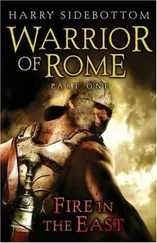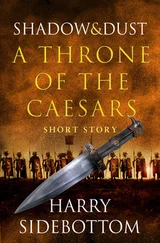Harry Sidebottom - Blood and Steel
Здесь есть возможность читать онлайн «Harry Sidebottom - Blood and Steel» — ознакомительный отрывок электронной книги совершенно бесплатно, а после прочтения отрывка купить полную версию. В некоторых случаях можно слушать аудио, скачать через торрент в формате fb2 и присутствует краткое содержание. Год выпуска: 2015, ISBN: 2015, Издательство: HarperCollins Publishers, Жанр: Исторические приключения, на английском языке. Описание произведения, (предисловие) а так же отзывы посетителей доступны на портале библиотеки ЛибКат.
- Название:Blood and Steel
- Автор:
- Издательство:HarperCollins Publishers
- Жанр:
- Год:2015
- ISBN:9780007499908
- Рейтинг книги:3 / 5. Голосов: 1
-
Избранное:Добавить в избранное
- Отзывы:
-
Ваша оценка:
- 60
- 1
- 2
- 3
- 4
- 5
Blood and Steel: краткое содержание, описание и аннотация
Предлагаем к чтению аннотацию, описание, краткое содержание или предисловие (зависит от того, что написал сам автор книги «Blood and Steel»). Если вы не нашли необходимую информацию о книге — напишите в комментариях, мы постараемся отыскать её.
Blood and Steel — читать онлайн ознакомительный отрывок
Ниже представлен текст книги, разбитый по страницам. Система сохранения места последней прочитанной страницы, позволяет с удобством читать онлайн бесплатно книгу «Blood and Steel», без необходимости каждый раз заново искать на чём Вы остановились. Поставьте закладку, и сможете в любой момент перейти на страницу, на которой закончили чтение.
Интервал:
Закладка:
Kassiope : Modern Kassiopi on the northeastern coast of Corfu.
Kerman : Town founded by Ardashir I in the southeast of central Iran.
Kottabos : A game played at ancient drinking parties; wine dregs were flung from a cup at a target, with the object of knocking it down.
Labitulosa : Roman town, located close to the modern village of La Puebla de Castro in the southern foothills of the Pyrenees.
Laconia : Ancient territory of Sparta in the southern Peloponnese.
Lake of Curtius : Archaic monument in the middle of the Roman Forum taking the form of a sunken pool with statuary; the Romans themselves told different stories about its history.
Lake Trasimene : Site of a Roman military disaster engineered by Hannibal, modern Lake Trasimeno in the Umbrian region of Italy.
Lambaesis : Fortress of the 3rd Augustan Legion and capital of the Roman province of Numidia ; modern Tazoult in northeastern Algeria.
Lararium : Roman household shrine.
Latrunculi : ‘Robbers’, a Roman board game similar to draughts or chess; its exact rules are lost.
Legate : From Latin legatus , a deputy of a high-ranking magistrate or an Emperor, from the latter sense a commander of a legion; drawn from the senatorial classes.
Legio III Augusta Pia Fidelis : The 3rd Augustan Legion, Pious, Faithful; stationed at Lambaesis in the province of Numidia with detachments serving in the neighbouring province of Africa Proconsularis .
Legion : Unit of heavy infantry, usually about 5,000 men-strong; from mythical times, the backbone of the Roman army; the numbers in a legion and the legions’ dominance in the army declined during the third century AD as more and more detachments served away from the parent unit and became more or less independent units.
Legionary : Roman regular soldier serving in a legion.
Leno : Latin, ‘pimp’.
Lethe : In Greek mythology, river flowing through the underworld; drinking its waters made the dead forget their past life.
Libation : Offering of drink to the gods.
Liberators : Name given to the assassins of Julius Caesar.
Libertas : Latin term for freedom or liberty; a political slogan throughout much of Roman history, though its meaning changed according to an author’s philosophical principles or the system of government that happened to be in power. Also worshipped in personified form as a deity.
Liburnian : Under the Roman empire, name given to a small warship, possibly rowed on two levels.
Lictor : Attendants assigned to senior Roman magistrates as bodyguards and ushers; often ex-Centurions.
Lucullan : Red-flecked black marble named after Licinus Lucullus, famously wealthy Senator who first imported the stone to Rome in 74BC.
Ludus Magnus : Gladiatorial school located to the east of the Flavian Amphitheatre.
Lupanar : Latin, ‘brothel’; literally, ‘den of she-wolves’.
Lusitanians : From Lusitania, Roman province of the eastern Iberian peninsula, covering much of modern Portugal.
Mamuralia : Festival held on the Ides of March or the day before; possibly an archaic celebration of the new year, which in the old Roman calendar began in March. Ancient authorities were unsure of its significance; commemorated by ritually beating an old man tied in an animal skin.
MappalianWay : Road leading out of Carthage.
MarcomannicWar : War waged c. AD166-180 along the whole of the northeastern frontier of the Roman empire to prevent incursions by Germanic and Sarmatian tribes.
Marius : Poem on the statesman Marius alleged to have been written by Gordian the Elder; only the title survives.
Mars : Roman god of war.
Mauretania Caesariensis : Roman province of eastern Mauretania, roughly corresponding to northern Algeria.
Mazda : See Ahuramazda.
Media : Ancient region of the Sassanid empire, northwestern Iran.
Mediolanum : Modern Milan in northern Italy.
Mercury : Roman god of travellers.
Mesopotamia : The land between the rivers Euphrates and Tigris; the name of a Roman province (sometimes called Osrhoene).
Metubarbis marsh : Wetlands north of the Savus river in Pannonia.
Milites : Latin, ‘soldiers’.
Milvian Bridge : Major bridge over the Tiber to the north of Rome; an original wooden crossing was replaced by stone in 115BC, which still survives.
Misenene : From Misenum.
Misenum : Base of the Roman fleet on the western shore of the Italian peninsular, modern Miseno.
Mithridatium : Prophylactic against poison claimed to have been invented by Mithridates VI of Pontus in the first century BC, who dosed himself with small quantities of harmful substances. Subsequently forced to commit suicide, he tried to poison himself but had to resort to a sword.
Mobad : Persian priests of the Zoroastrian religion.
Modusvivendi : Latin, ‘way of living’.
Moesia Inferior : Roman province south of the Danube, running from Upper Moesia in the west to the Black Sea in the east.
Moesia : Ancient geographical region following the south bank of the Danube river in the Balkans.
Mogontiacum : Roman legionary fortress and capital of Germania Superior ; modern Mainz.
Memento mori : From Latin, literally ‘remember to die’.
Moorish : See Moors.
Moors : Belonging to the Mauri tribe that gave its name to Mauretania , western North Africa.
Mos maiorum : ‘The way of the ancestors’; fundamental Roman concept that theoretically governed most aspects of public and private life.
Mount Ida : In Greek mythology, name of two mountains sacred to the mother goddess; this one was located in Phrygia, central Turkey.
Mount Istone : Ancient name for the Pantokrator mountains on the island of Corfu.
Mount Ocra : Ancient name for Triglav, the highest mountain of the Julian Alps, located in modern Slovenia.
Mount Prion : Partly covered by the ancient city of Ephesus; famed in antiquity for its marble quarries.
Mutina : Modern Modena in northern Italy.
Natiso : Ancient name for the Natisone river, flowing between Italy and Slovenia.
Nefastus : An unpropitious day, one on which it was unlucky to conduct public business.
Negotium : Latin, ‘business, both private and public’.
Nikal : Ancient Mesopotamian moon goddess worshipped at Carrhae; wife of Sin.
Читать дальшеИнтервал:
Закладка:
Похожие книги на «Blood and Steel»
Представляем Вашему вниманию похожие книги на «Blood and Steel» списком для выбора. Мы отобрали схожую по названию и смыслу литературу в надежде предоставить читателям больше вариантов отыскать новые, интересные, ещё непрочитанные произведения.
Обсуждение, отзывы о книге «Blood and Steel» и просто собственные мнения читателей. Оставьте ваши комментарии, напишите, что Вы думаете о произведении, его смысле или главных героях. Укажите что конкретно понравилось, а что нет, и почему Вы так считаете.
